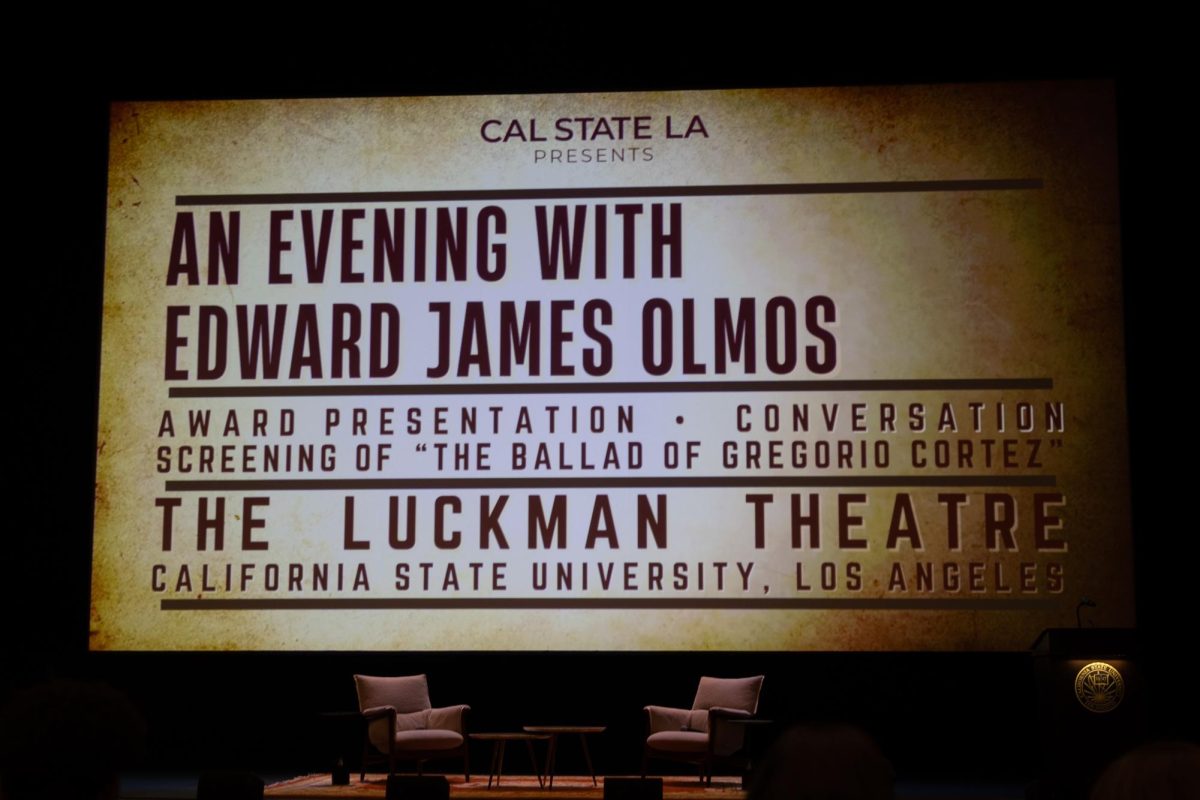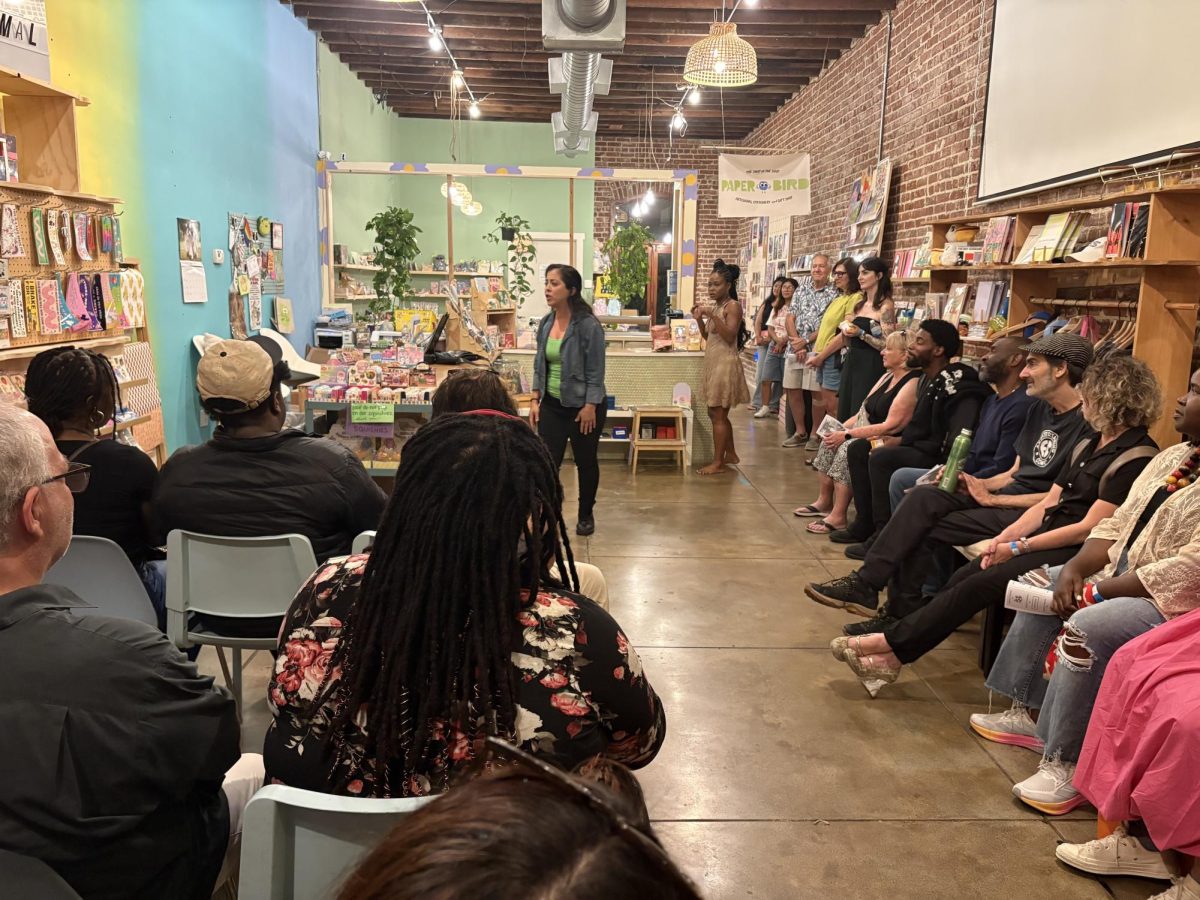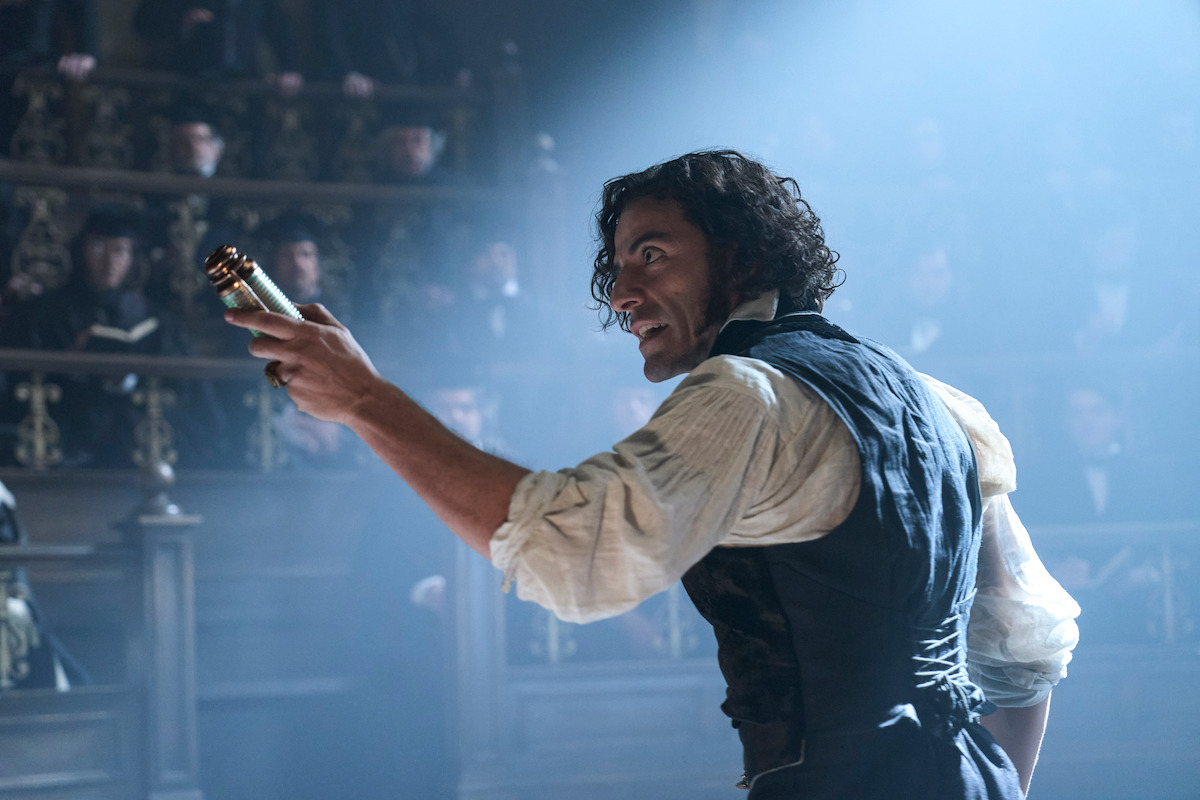When considering venues in Pasadena to enjoy performing arts, the Pasadena Playhouse or the Ambassador Auditorium likely come to mind. The Shakespeare Club on Grand Avenue may not be as well-known to many Pasadena residents, though it carries with it an incredible history and an impressive array of events in its present-day existence.
Dating back to its founding in 1888 as a women’s literary study group — “one of the first women’s clubs in the West,” according to their website — the organization continues to be an outlet for the artistically inclined to perform, watch, and enjoy theater in an Italian Renaissance-style villa. In May, the club hosted a free, open to the public reading of Noël Coward’s 1925 play “Hay Fever” in celebration of the play’s 100 year anniversary.
The club’s creative minds spoke about their experiences in the club, reflections on the performance of “Hay Fever,” and the significance of the work of their club’s namesake.
Its current artist-in-residence, Richard Kenyon, had been drawn to the building when he spotted it 7 years ago.
“We were driving around Pasadena, just exploring since we were new to the area,” Kenyon explained. “My mother-in-law was in the passenger seat when she suddenly said, ‘Richard, look—look at that!’” Unsure of what she was talking about, he pulled over. “And there it was, right across the street —the Shakespeare Club sign,” he said.
After contacting the club, the members of the then-all-female organization invited him to a party at the Shakespeare Villa. Kenyon attended dressed as Marc Antony from Shakespeare’s “Julius Caesar,” even performing a monologue for the attendees.
“It was, in many ways, my audition,” Kenyon said. Not long after that, Kenyon attended meetings and met board members.
“From the start, they were incredibly warm and welcoming to both me and my family,” he commented, also noting that those at the Shakespeare Club recognized the value he found in their organization’s namesake: “They could tell I didn’t just talk the talk–I lived and breathed this work.”
Actress Katie Thompson, who hails from London, England, remembers her introduction to the club about four years ago.
“I think it was just shy of the pandemic,” she said. When out to dinner with her neighbor Megan, one of the group’s readers, she learned of the organization’s live readings. “I had said to her that I used to act in England a long time ago in my sort of high school and post-high school days.” Thompson explained that she had experience with musical theater and had “always loved acting,” and her neighbor encouraged her to come to a reading.
“And I thought, ‘Oh, I never studied Shakespeare.’ I think I read ‘Romeo and Juliet’ in high school,” Thompson said. While she was initially apprehensive, she decided to give it a try.
She recalls the atmosphere of the first performance she took part in. “It was outside, in their beautiful patio and they had this festoon lighting, and it was just idyllic,” Thompson said. She also remembered “hummingbirds shooting back and forth, and it was a wonderful summer’s evening…it just reignited the sort of acting passion that I used to have and the buzz I used to get from it.”
Actor Paul Gore had been doing some improv in West LA and theater at the Morgan-Wixson Theater in Santa Monica prior to moving to Pasadena.
“When I moved to Pasadena, I was looking for something similar, some cultural things in Pasadena,” Gore said. “And I just happened to go to an open house, I believe, at the Pasadena Museum.” He recalls having talked to a guest who mentioned the Shakespeare Club. “I was talking to someone and they said, ‘Oh, there’s a place not too far from here, the Shakespeare Villa…Maybe you could check that out.’”
Gore explained that Kenyon mentioned to him that the club was going to perform Henry V.
“I said, ‘Oh, I’d love to be a part of that,’” He recalls being part of that show in late summer of 2019, saying that he has “been just loving it ever since.” He adds that he has done a number of performances with the Shakespeare Club since then, and loves “all the people in our little group.”
When the organization performed “Hay Fever,” a comedic farce written by Noël Coward, the occasion was a special one: this play’s premiere marked its 100-year anniversary as of this year. It centers on the Bliss family– Judith, a retired actress, her husband David, an author, and their adult children, Sorel and Simon– as they interact with the four guests they have each invited to their home to spend the weekend.
The group reflected on the timelessness of the play, and how similar the characters are to people you might meet in the present day.
“For me personally, the more you explore the past, the more you realize that, you know, some things don’t really change,” director Luanne Morrow said. “There was so much social change…and freedom for women that they didn’t have before, and a lot of upheaval from… the First World War and how it changed the way people were in life.”
Gore also found a sense of universality within the material of “Hay Fever,” commenting that the relationships between characters “almost felt like a precursor” to many present day comedies.
Thompson noted that the characters defy our modern expectations of how people of the past behaved, commenting, “…You think back to 100 years ago…you imagine them to be so prim and proper, you don’t imagine that they were even thinking about inviting people down to the house for the weekend that they might have a relationship with, even though they were married to someone else.”
As she also acknowledged that people of the early 20th century “were coming out of the Victorian period,” which, the actress noted, “has everyone led to believe that they were so prim and proper and so stiff,” Thompson recognized Coward’s potential inspiration: those around him.
“…Just through these wonderful plays that are available to read and produce and act in, you find out these characters existed in not only his head, but he probably knew these people as well… these real living people that he was writing about,” she added.
Kenyon explained that he had read and watched a lot of Coward’s work, saying, “I knew what I would love to do. And that’s always been the question. Can we pick the play and can we execute it on what we think that play is?”
He noted that he knew that Morrow would cast “Hay Fever” in “a way that would be absolutely perfect,” adding, “I don’t really think we’ve had a show that has been so perfectly cast as ‘Hay Fever.’”
“It was wonderful to me because…I read it, and I’ve seen it, I loved it, and I just thought, this is a play we have to do…we have to present this to the world,” Kenyon said, saying that the play was not only accessible, but because of Coward’s “vision of family,” agreeing with Gore’s view of the play having a certain timeless quality.
“Family is family is family is family, whether it’s two, three, four, or ten thousand years ago!” Kenyon said with a laugh, adding, “We’ve never laughed as much in a reading that we’ve done…sometimes a perfect storm happens, and this was everything that kind of connected and sort of fit together like a beautiful sort of puzzle…which is always the thrill, you know?”
He concluded with a reflection on the impact of a play’s execution on an audience, saying, “Each play, you want it to…connect to an audience, but you want it to be executed so that an audience [has] the best opportunity to go, ‘wow, so that’s what that play is. That’s what that play is like. That’s what that playwright is writing.’”
Morrow spoke about her dual role as director and actress in ‘Hay Fever,’ having taken on a small role in the show as Clara, the housekeeper of the Bliss family. She shares that she did not intend to be in the play, but there are times when the cast doesn’t have an extra person needed for a role.
“For me…it’s more satisfying if I can direct and not be in the show,” Morrow said, citing the short time to rehearse for this show as a reason to direct as opposed to acting in a play.
Morrow also explained that once she is finished directing after a rehearsal on a Tuesday night, she is able to become more focused on being the role that she’ll play on stage, saying, “When I get there on the Thursday, I’m part of the cast.” Speaking on her role as a director in that moment, she says, “My role is essentially done, it kind of has to be, and then you’re in the mindset of, ‘we’re just doing this play.’”
“It’s like a runaway train…you’ve got to jump on…It’s leaving the station,” Morrow said of the feeling she gets when a show begins. “Everyone starts speaking, and you start speaking, and you start to be part of it, and everything else just goes away, so you…forget about what you were doing as a director…you just focus so much on the acting.”
“With ‘Hay Fever’ in particular, since my part was really small, it was kind of fun, because I kind of felt like I was getting to watch the show,” she said.
The group also spoke about Shakespeare’s legacy and the enduring value that can be found in his work.
“I think he’s timeless,” Gore commented. “The characters that he developed are still relevant today…When you read his plays, you see people today, you see the same kind of relationships…there’s just something magical about him.” He added, “It’s like peeling an onion. There’s so many layers in the stories, the characters…they’re really timeless.”
Morrow agreed, saying, “He wrote about humanity, he wrote about the human experience.” While she notes some factors of daily life, whether those be what cities and family structures look like, Shakespeare’s writings expressed very human experiences, relating to “love, and parenthood, and friendship… he captured that so beautifully.”
She added that she believes Shakespeare’s relevance also lies in the potential of his plays to have a diverse cast.
“You can do Shakespeare in such a multitude of ways, with such a diverse cast. I don’t think I’ve ever known a playwright that you can so freely change the gender of characters and have it work seamlessly…It doesn’t matter what the ethnic background of a person is. Everybody can play Shakespeare,” Morrow said.
She also explains that she and Kenyon have worked on plays where they have swapped the genders of characters, saying, “It just works…it’s just the human experience.”
Thompson said she found it “fascinating” that Shakespeare “encapsulated the female experience so well in a time when women weren’t particularly looked at in a favorable way. It seems like he was able to recognize that they were more than just…for providing life, and or cleaning, and or cooking.”
“Thinking about back then…it didn’t seem to be the norm that men would recognize women like that. And yet you read his plays now, and you think, ‘oh my God, this was written, you know, 400 years ago…he got what women were going through when nobody else seemed to really care,” Thompson said.
Kenyon considered how relatable Shakespeare’s work is to a multitude of life experiences and emotions, saying, “He articulates the human experience in a way for me that few, if any, playwright has ever been able to do…it’s timely, it’s so timely.”
Morrow shares that she often tells people not to read Shakespeare’s work, but to see it performed. “For your first experience with Shakespeare, if you can see it, and hear it, even if you just listen to…an audiobook version of it.” She added that content can be found on YouTube as well, from a variety of different theater companies.
“Shakespeare was meant to be performed. He didn’t write his plays for people to sit and read them,” she said.
She explained that reading Shakespeare can feel overwhelming due to the language, and that it could feel like “an academic exercise, like something you had to do for…your English class.” Morrow said that if you listen to Shakespeare’s work, or read the words aloud, it can become easier to understand.
“Even if you don’t immediately know what you’re saying, if you read it aloud– I think it has more meaning, so I would just really just encourage people, any chance they get…to hear it, and to see it…To me, that’s the best way to first experience Shakespeare. And you might go back and read the play again, but…to me, you need to see it take shape and be alive,” Morrow said.
Gore agreed, saying, “It’s really meant to be heard, to be seen, to be listened to, to be read out loud or performed, that’s really where the experience is with Shakespeare.”
Kenyon explained that since the role of director was not used in Shakespeare’s time, the playwright “built in” a director within the work he produced so that the actors would know what to do when rehearsing. “There were so many moments where you go, ‘That’s Shakespeare telling us what we need to know…’As simple as an entrance and an exit; a character would say, ‘Here comes the Duke of York!’ And in walks the Duke of York.”
He explained that Shakespeare “had codified those plays with stage directions that he knew his actors could look at in three days,” adding that additional days would be added for dances or swordfight choreography.
“Something that has been very important to me over the last couple of years has been that…especially when new people come to the group who have never done Shakespeare, and there’s so many that do, I always say this: ‘It’s your voice, your Shakespeare.’ It doesn’t have to be in a proper, posh, British voice, it doesn’t, and it shouldn’t be if you don’t have that voice,” Kenyon said.
He also considered how the value that can be found in Shakespeare’s work can be lost in educational settings. “These texts are so rich…and they’re often taught by teachers, I’m afraid, that just don’t know that, and they don’t understand it…so it just basically becomes a Venn diagram on the board… ‘Romeo, Juliet, Capulets here, Montagues there, this is it, test on Friday.’ He adds, “And you don’t feel like you get any sense of the… richness… of the words, and the text and the language.”
As for advice for anyone looking to make room for creativity in their lives? “Join our club,” Thompson said, adding, “you get to sink your teeth into something different every month.”
So although this organization may not be frequently named or recalled when considering where to see a performance, or as a place to hone your acting skills, this hidden gem is very worthy of consideration to do either–or both.
To learn more about the Shakespeare club, find them on Instagram, @shakespeare_club_of_pasadena, or visit their website, found at shakespeareclub.org.

















Mj lob • Oct 13, 2025 at 8:16 am
Thank you for the enjoyable, informative article!